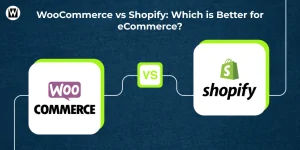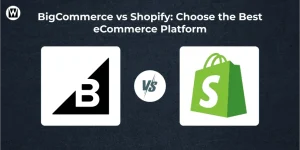Shopify vs Prestashop: Features Comparison & Key Differences
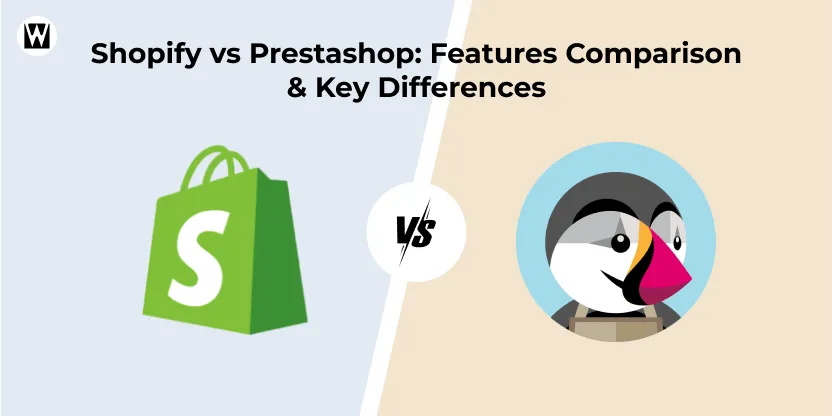
Choosing the right eCommerce platform is crucial for your online business. Your platform dictates how you build your store, list your products, manage payments, and streamline your operations. Fortunately, numerous eCommerce platforms are available on the market; each comes with different functionalities that may or may not fulfil our business objectives.
Both Shopify and PrestaShop offer strong eCommerce features, but choosing the best platform for your company will depend on your budget and particular requirements. Shopify is an excellent choice if you’re looking for a dependable, user-friendly platform without technical expertise. However, PrestaShop is better if you want a platform with incredible customisation and international sales capabilities.
This blog will explain how these eCommerce platforms differ, helping you make an informed decision. Let’s start with an in-depth comparison guide with a brief introduction.
What is Shopify?
Shopify is a beginner’s eCommerce platform that lets you quickly set up a store in the cloud. It makes handling everything from product listings to payments easy, whether you sell a few products or run a full-blown business.
It’s also primarily popular among entrepreneurs because of its user interface and advanced features, which are scalable as a business grows. Thus, it is an excellent fit for small or large companies.
- Shopify supports more than 1.7 million businesses around the globe.
- In 2024, Shopify is expected to reach over $7.5 billion in global revenue.
- In 2023 alone, Shopify merchants sold more than $200 billion of products.
- It supports over 175 payment gateways, making transactions more manageable for merchants and customers.
What is Prestashop?
PrestaShop is an open-source eCommerce platform focusing on helping businesses build customized online stores.
In contrast to Shopify, PrestaShop is much more developer-centric. It provides robust flexibility for those who customize every part of their store. It’s ideal for businesses with a clear vision who want to customize their design and features without the limitations that a hosted solution may impose.
- Around the globe, PrestaShop serves close to 400,000 active stores.
- It supports over 60 languages, ensuring accessibility for various users.
- Store customization and feature expansion are supported with more than 1,000 add-ons.
- PrestaShop serves over 250,000 businesses in more than 190 countries.
- In 2023, PrestaShop processed more than $8 billion in eCommerce payments worldwide.
A Quick Verdict on Shopify vs Prestashop
Selecting the best eCommerce platform can be the difference between a thriving business and a struggle. The decision is tied to your business needs, technical aptitude, and goals.
Of these platforms, Shopify and PrestaShop stand out as two of the most popular – but they target very different breeds of entrepreneurs. So, how do these two platforms compare? Here’s how their key differences and characteristics break down so you can decide which one works best for you.
| Aspect | Shopify | Prestashop |
|---|---|---|
| Founded Year | 2006 | 2007 |
| Headquarters | Ottawa, Canada | Paris, France |
| Global Reach | Available in 175 countries | Available in 190 countries |
| User Rating | 4.7/5 (Trustpilot) | 4.2/5 (Trustpilot) |
| Ease of Use | Extremely user-friendly, designed for beginners | Requires technical knowledge for customization |
| Hosted or Self-hosted | Hosted (cloud-based) | Self-hosted (requires own server) |
| Costing | Starts at $39/month | Free (with paid add-ons) |
| Customization | Limited to themes and apps | Fully customizable, requires coding |
| Themes & Design | 100+ free and paid themes | Thousands of free and paid themes |
| Transaction Fees | 2.9% + 30¢ per transaction (with Shopify Payments) | No transaction fees, but requires payment gateway integration |
| Payment Gateways | Over 175 supported | Over 60 supported |
| Support | 24/7 support (chat, email, phone) | Community forums with paid support available |
| App Marketplace | Over 6,000 apps | Over 3,000 modules |
| Learning Curve | Low, easy to get started | High, requires technical expertise |
This comparison gives you a clear look at the key features of each platform. Whether you value simplicity and quick setup (Shopify) or greater flexibility and control (PrestaShop), the best platform depends on your specific business needs and capabilities.
Shopify vs. Prestashop - An In-depth Comparison
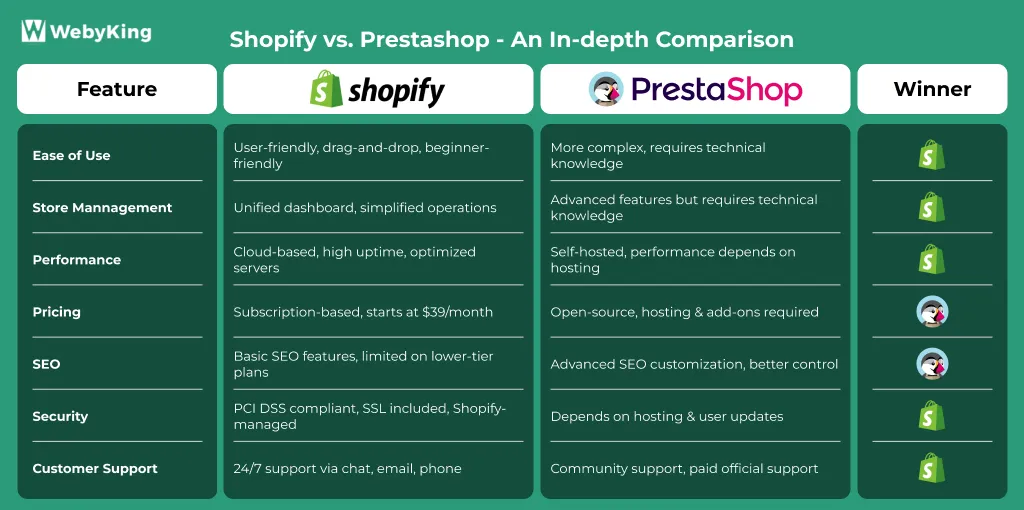
Shopify vs. Prestashop: Which is the right eCommerce platform for you? Both platforms provide robust features, but they target different use cases and user setups. In this section, we will compare these platforms based on various elements and metrics to help you choose the best fit for your online store.
Ease of Use
Shopify
Shopify is known for its simplicity and user-friendly interface. You don’t have to be a techie to set up and run your store. Store management is a cakewalk with a drag-and-drop feature and an organized dashboard.
Prestashop
PrestaShop, however, is a little more complicated. This model provides excellent flexibility and customization options but may be difficult for beginners to get up and running. Some things about your store will probably require technical expertise or the assistance of a developer to manage.
|
Want to launch your online store on Shopify? Our experts help you create a feature-rich, user-friendly store tailored to your business needs.
Store Management
Shopify
With Shopify, you get a unified dashboard to simply manage all your orders, inventory, and customer data easily. It’s intended to simplify your store’s day-to-day operations, with tools that make it easy for small business owners to manage everything from A to Z.
Prestashop
With multi-store support, advanced inventory management, and detailed reporting, Prestashop provides you with more control over your store management. But it could take a little more technical knowledge to reap the benefits of these features.
|
Performance
Shopify
Shopify is built on very powerful servers and offers great performance so that your store runs smoothly even in the case of some traffic spikes. It scales seamlessly and minimizes downtime with fast load times.
Prestashop
Prestashop’s performance is heavily dependent on hosting provider and configuration options. While it can perform well, PrestaShop is self-hosted, meaning you’re responsible for optimizing the site’s speed and uptime.
Winner: Shopify Why: Shopify’s reliable, cloud-based hosting guarantees consistent performance and scalability, while PrestaShop requires more maintenance and attention. |
Pricing
Shopify
Shopify offers 3 core plans with subscription-based pricing: Basic, Shopify and advanced. Prices start at $39/month, and you’ll also need to factor in transaction fees, additional apps, and premium themes.
Prestashop
PrestaShop is open-source software that you can download and use free of charge, but you do have to cover hosting, themes, and any features offered as paid add-ons. The cost can vary greatly depending on the features you require.
Winner: PrestaShop Why: Because PrestaShop is open source, it is often the cost-effective option for merchants who are tech-savvy or have the budget to handle custom development and hosting. |
SEO
Shopify
Shopify includes an SEO-friendly approach, allowing you to customize titles, meta descriptions, etc. That said, the lower-tier plans have limited functionality when it comes to SEO.
Prestashop
PrestaShop does provide more advanced SEO features like full control over URLs, meta descriptions, and page titles. It also includes various Search Engine Optimization modules for enhanced site performance and offers greater control over search rankings.
Winner: PrestaShop Why: PrestaShop offers more advanced SEO customization and allows store owners more freedom to optimize their websites for search engines. |
Security
Shopify
Shopify is PCI DSS compliant and provides SSL certificates for secure transactions. It constantly refreshes its security tools, so your store is protected from dangers and vulnerabilities.
Prestashop
PrestaShop supports high-security features such as SSL compliance and issue updates to maintain security. Nonetheless, being a self-hosted solution, the security aspects highly rely on the hosting provider and the store owner for updates and patches.
Winner: Shopify Why: Because Shopify is a hosted solution, the platform is responsible for security, giving users who don’t have a technical background peace of mind. |
Customer Support
Shopify
Shopify provides round-the-clock support via live chat, email, and phone. Highly rated for responsive and helpful support solutions, resolving issues quickly.
Prestashop
PrestaShop also offers community support and documentation, but the official support options are fairly limited unless you pay for a support service. That makes it harder for people who require instant help or support.
Winner: Shopify Why: If you need support and assistance 24/7, then Shopify is a better option with its responsive customer support and the huge pile of resources it has. |
In short,
For users who want a user-friendly, comprehensive solution with great customer support, performance and security, Shopify is a top contender. Perfect for beginners and stores looking to focus on growth, rather than fry their brains with technical mumbo jumbo.
On the other hand, PrestaShop is great for users with technical knowledge or a team who can fully customize their store. While more time-consuming to build and manage, it provides more design, SEO, and payment option flexibility.
Both platforms have their strengths, so the right choice depends on your specific needs—whether you prioritize ease of use or customization flexibility.
Which Platform is Right for You? (Beginners, Startups, Existing Businesses, Enterprise-level)
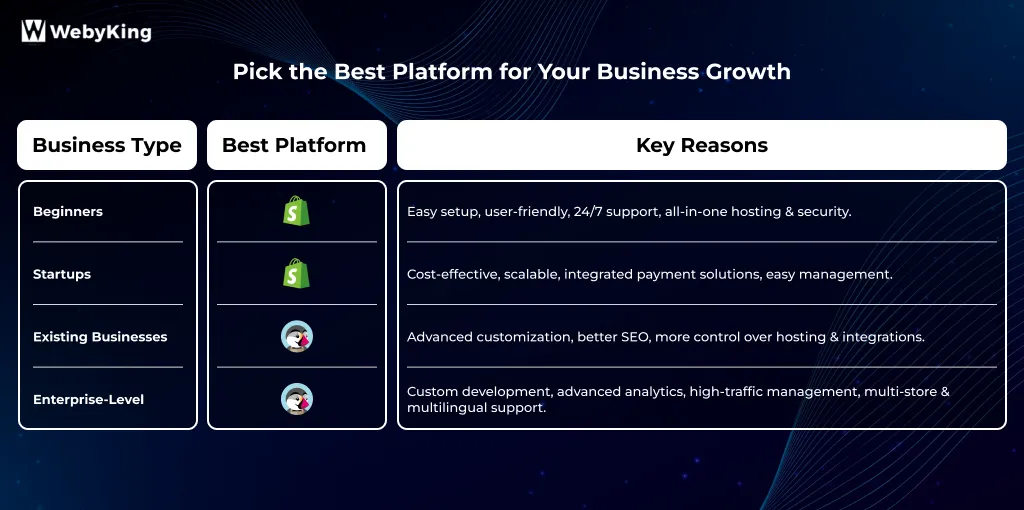
When it comes to choosing an eCommerce platform, much will depend on what type of business you run, how big your business is, and how technically savvy you are. Each solution has its advantages, which fit particular stages of a business.
Whether you’re a beginner, a startup, an established business, or working on an enterprise-level project, understanding the strengths of each platform can guide you toward making the right decision.
For Beginners
- Ease of Use: Shopify is perfect for novices and people with little to no technical experience, given its user-friendly interface and easy setup.
- Customer Service: 24/7 customer service means you can get assistance right when you need it, which is a great comfort when you are starting.
- All-in-one Solution: Shopify takes care of your hosting, security, and updates, which means that you don’t have to deal with the technical stuff.
- Design Freedom: A large selection of templates and easy customization, great for eCommerce beginners.
Best Platform to Use: Shopify Why: Shopify is the perfect option for beginners due to their simplicity and dedicated support, which allows you to get your store online without all the complex setup. |
For Startups
- Cost-Effectiveness: Shopify has pay-as-you-go pricing plans that allow a low-cost introduction for new startups with the flexibility to expand as needed.
- Customizable: If your startup demands more specialized, tailor-made features then PrestaShop provides extensive customization options.
- Scalability: While both platforms will grow with your startup, Shopify manages the technical aspect of scaling better.
- Payment Flexibility: While Shopify uses an integrated payment solution, PrestaShop is an open-source platform that allows users to choose their payment solution.
Best Platform to Use: Shopify (simple for growth and all-in-one management) Why: It’s a balanced, cost-effective, and scalable solution that’s also easy to use—perfect for startups seeking growth without significant technical bottlenecks. |
We’ll help you build a custom Shopify store that’s ready to sell and grow your business — so you can focus on what matters most.
For Existing Businesses
- Advanced Functionality: One of the more advanced customization options is something PrestaShop offers that makes it ideal for companies with distinctive, unusual needs.
- SEO Features: The SEO flexibility of PrestaShop helps existing stores to have more advanced optimization.
- Third-party Integrations: Both platforms offer integrations but PrestaShop provides you with more control over integration customization.
- Hosting Control: PrestaShop is self-hosted, which means businesses have greater control over their server and performance.
Best Platform to Use: PrestaShop Why: PrestaShop is more flexible for established businesses that need enterprise-level control customization and scalability. |
For Enterprise-Level Businesses
- Custom Development: Businesses at the enterprise level typically need very particular, complex features—PrestaShop permits more in-depth customization via custom code and integrations.
- Advanced Analytics & Reporting: While both platforms do offer solid analytics, PrestaShop as an open-source platform allows for more in-depth, complex reporting catered to larger operations.
- High Traffic Management: Shopify offers scalability without technical hassle, and PrestaShop provides greater control over high-traffic and heavy-duty transactions.
- Cross-Border Trade: With multi-store and multilingual support, PrestaShop is a perfect fit for companies expanding globally.
Best Platform to Use: PrestaShop Why: PrestaShop is customizable and scalable, and when a business knows what it wants, having control can be invaluable for large enterprises that need tailor-made solutions with complete autonomy. |
Summary
Shopify and PrestaShop are both robust eCommerce solutions with unique advantages for all types of businesses. Shopify is perfect for people who want ease of use, great customer service and want an all-in-one, easy solution. It is the best choice for beginners, startups, and businesses that aim to grow without taking their time in technical complications.
While PrestaShop offers more customization options and flexibility, making it an excellent option for businesses with specific requirements or needing more control over their website. It’s beneficial for established brands and companies seeking more advanced features, additional design flexibility, and more control over their store.
Ultimately, the decision relies on your business’s needs—whether you need a simple plug-and-play solution or a customizable engine with more technical control.
We have your back if you’ve realized that Shopify is the platform best suited for you! Choose our Shopify development and make sure you run your store quickly, efficiently, and professionally, optimised to WIN!
Frequently Asked Questions on Shopify Migration
1. Which platform is better for a business with no technical background—Shopify or PrestaShop?
For businesses with no technical background, Shopify is the better choice. Its user-friendly interface, drag-and-drop functionality, and 24/7 customer support make it simple for anyone to set up and manage their online store.
2. Can I scale my eCommerce store on Shopify if it grows rapidly?
Yes, Shopify is built for scalability. Whether your store sees a sudden spike in traffic or you expand to new product categories, Shopify handles scaling smoothly.
3. Is PrestaShop suitable for businesses planning to go global with multiple languages and currencies?
Absolutely! PrestaShop offers robust support for global expansion. Its built-in features allow you to create a multi-store setup, manage multiple currencies, and offer your store in different languages.
4. How does Shopify handle mobile responsiveness for eCommerce stores?
Shopify automatically provides mobile-responsive themes that adapt seamlessly to smartphones and tablets, ensuring a smooth shopping experience for customers on all devices.
5. What type of security features can I expect from PrestaShop for my online store?
PrestaShop offers solid security features, including SSL certificates, secure payment gateways, and regular security patches to protect your store from vulnerabilities.
Whether you’re upgrading technology, improving performance, or rebranding your business, this checklist ensures a smooth and successful migration every step of the way. Get Your Free Checklist Now!

Ravi Makhija, the visionary Founder and CEO of WebyKing, is a seasoned digital marketing strategist and web technology expert with over a decade of experience. Under his leadership, WebyKing has evolved into a premier full service web and marketing agency, delivering innovative solutions that drive online success. Ravi’s deep understanding of the digital landscape combined with his passion for cutting-edge technologies empowers him to consistently exceed client expectations and deliver results that matter.


